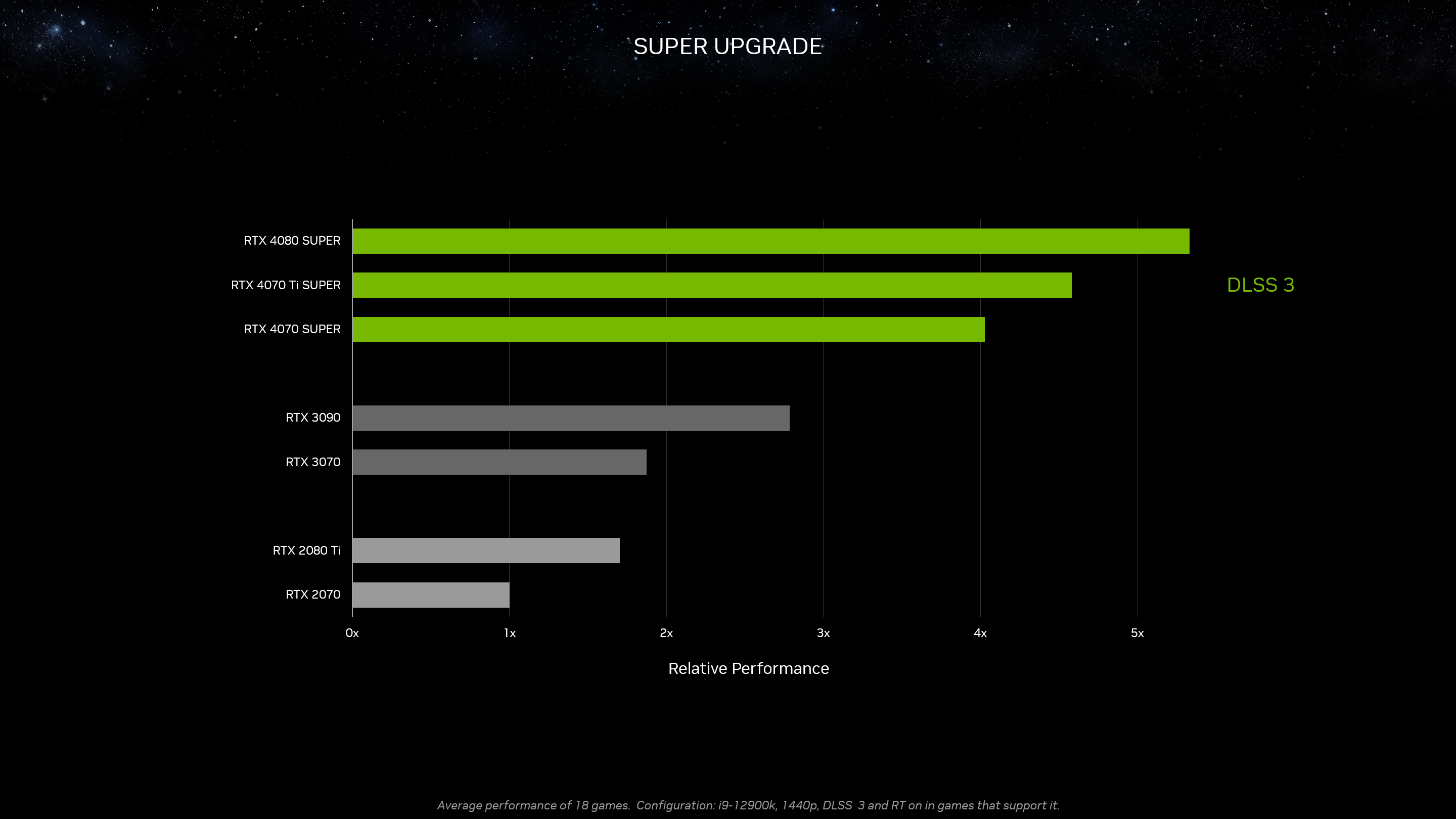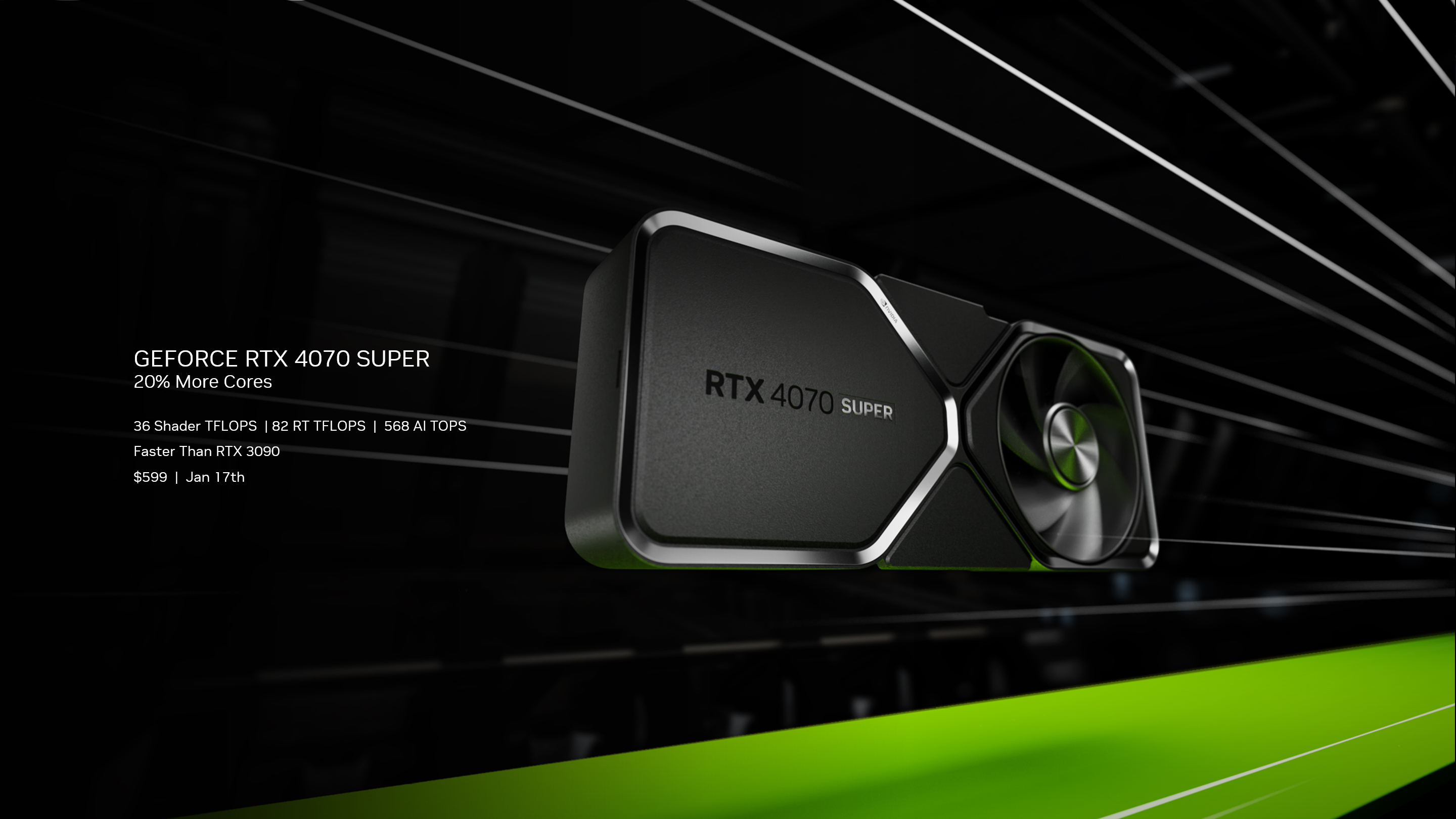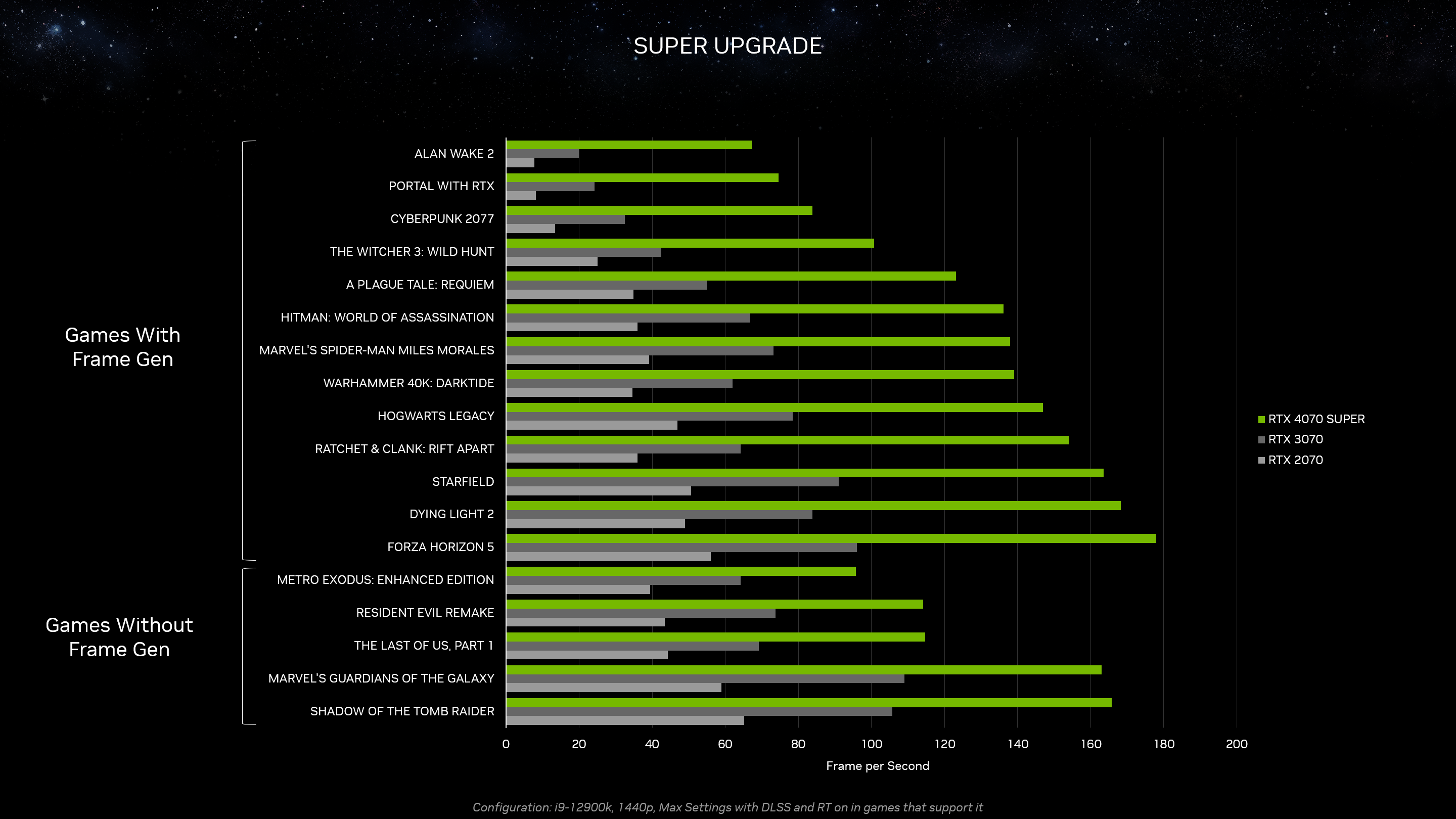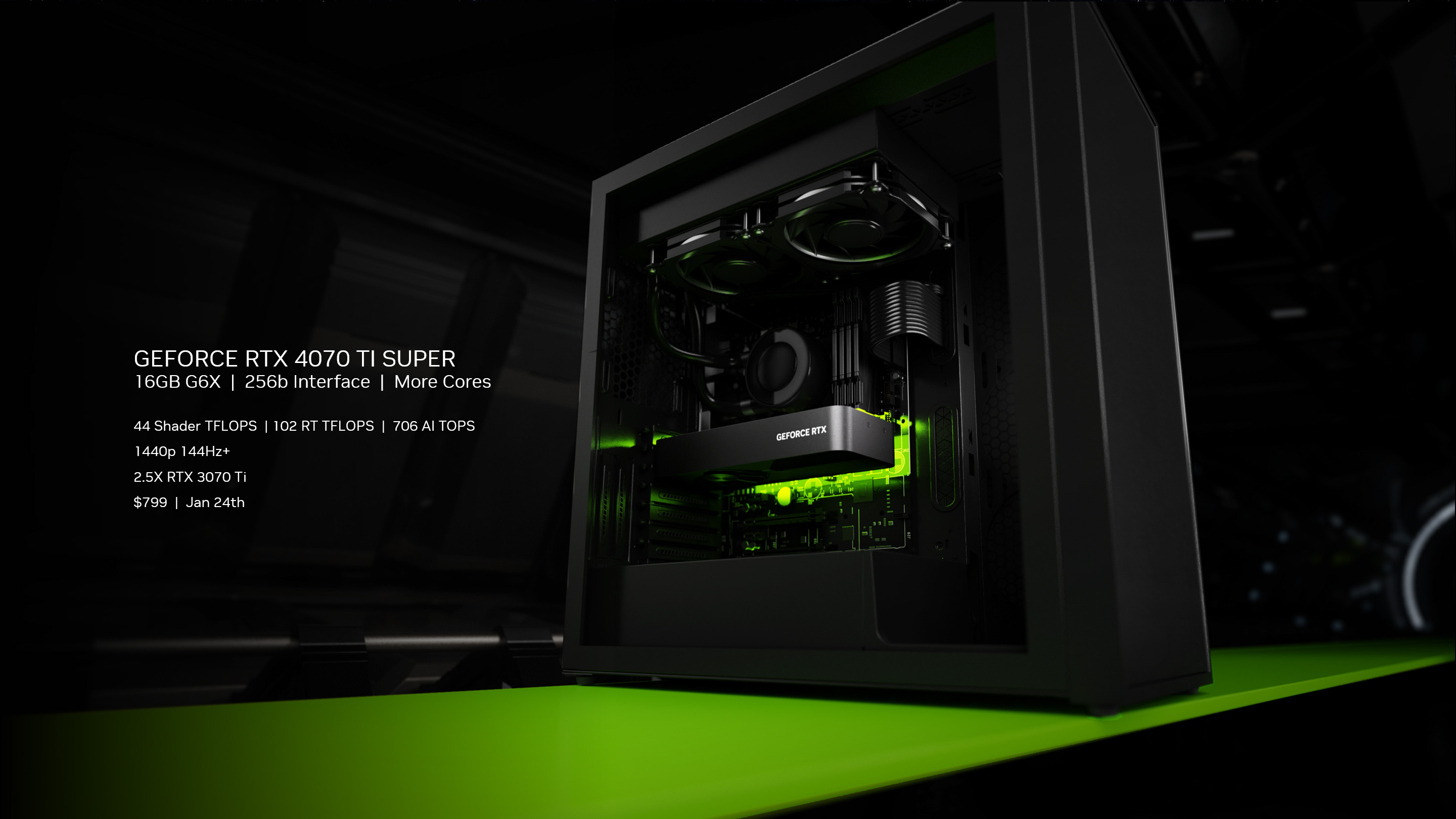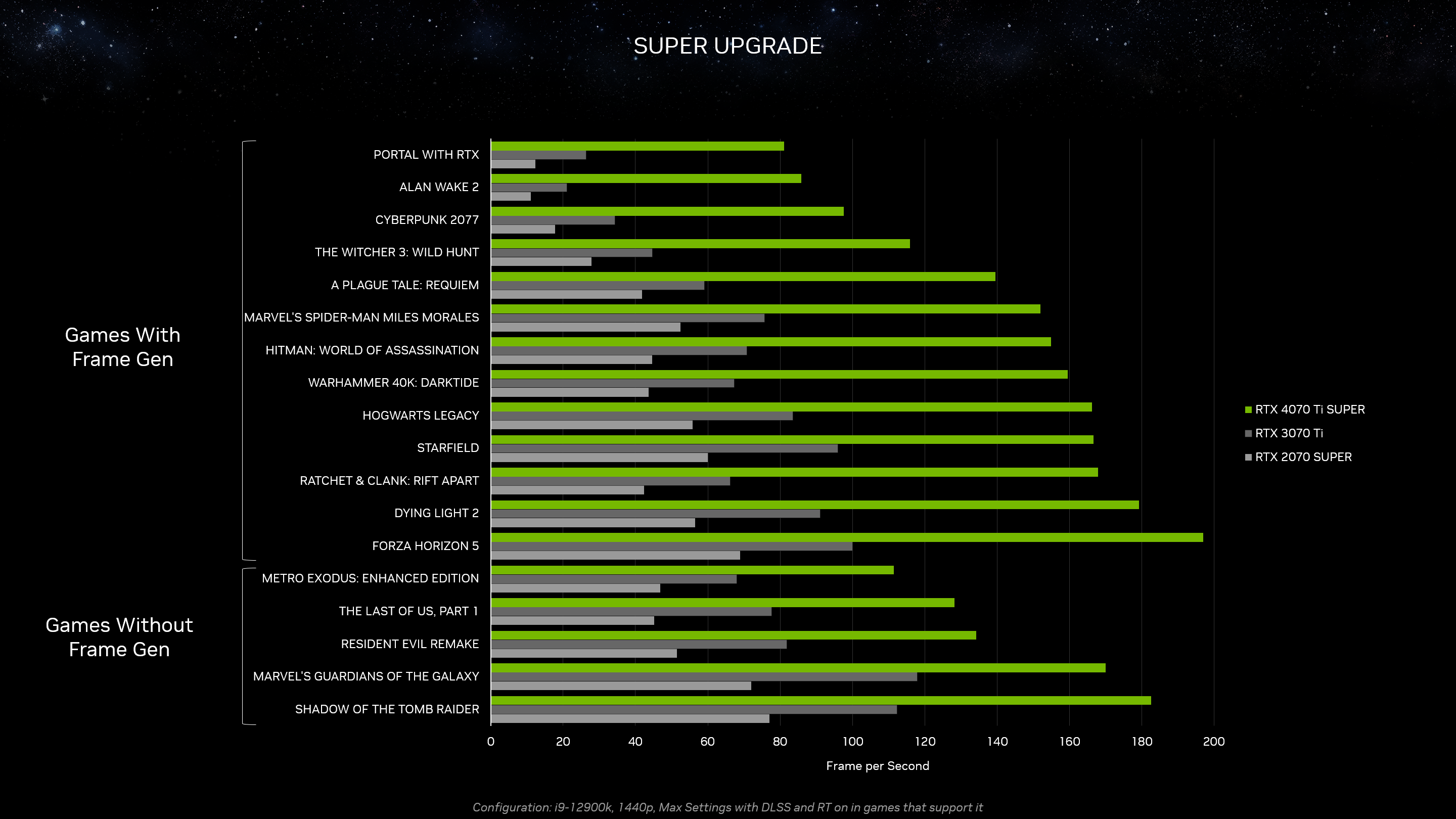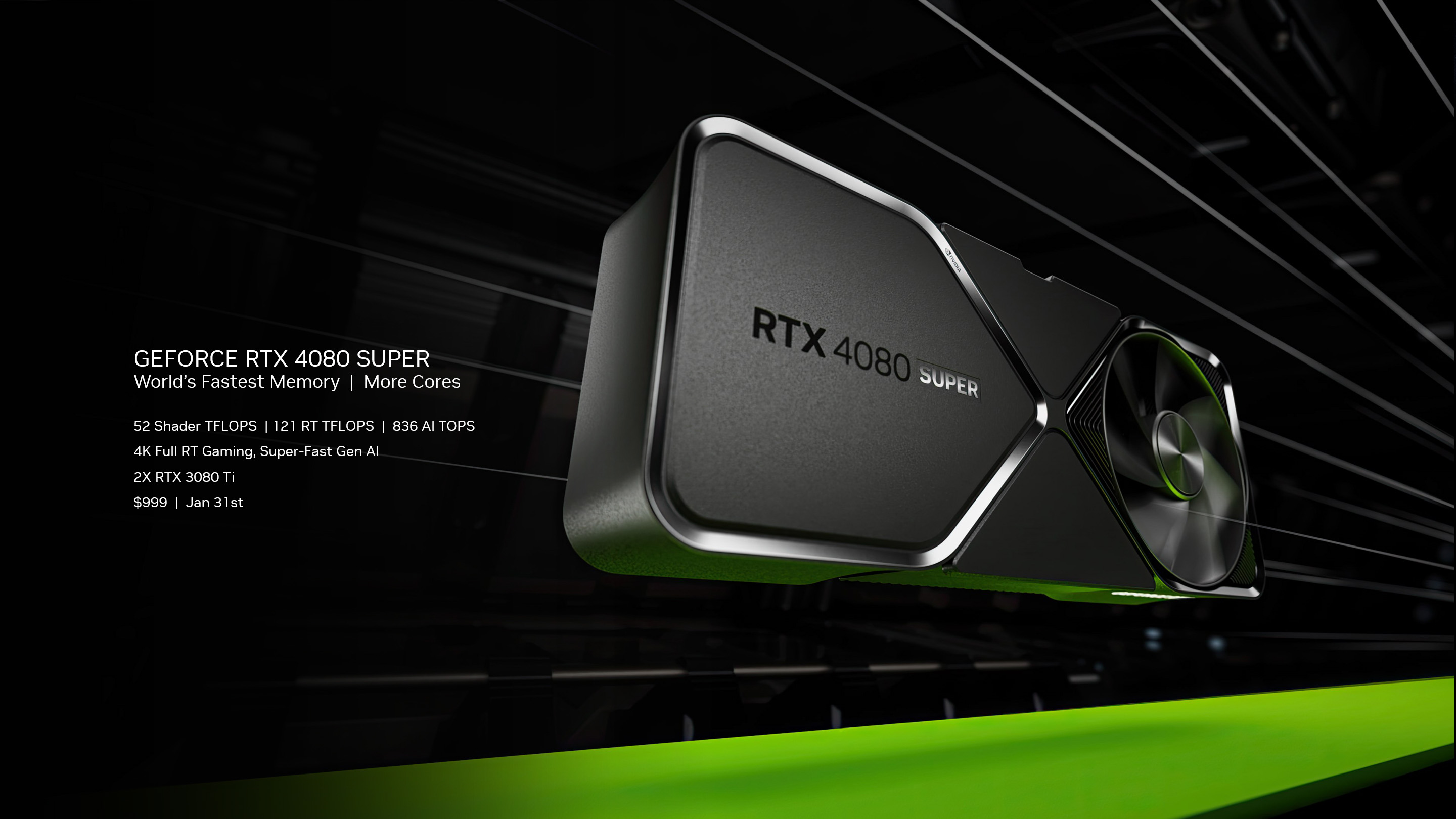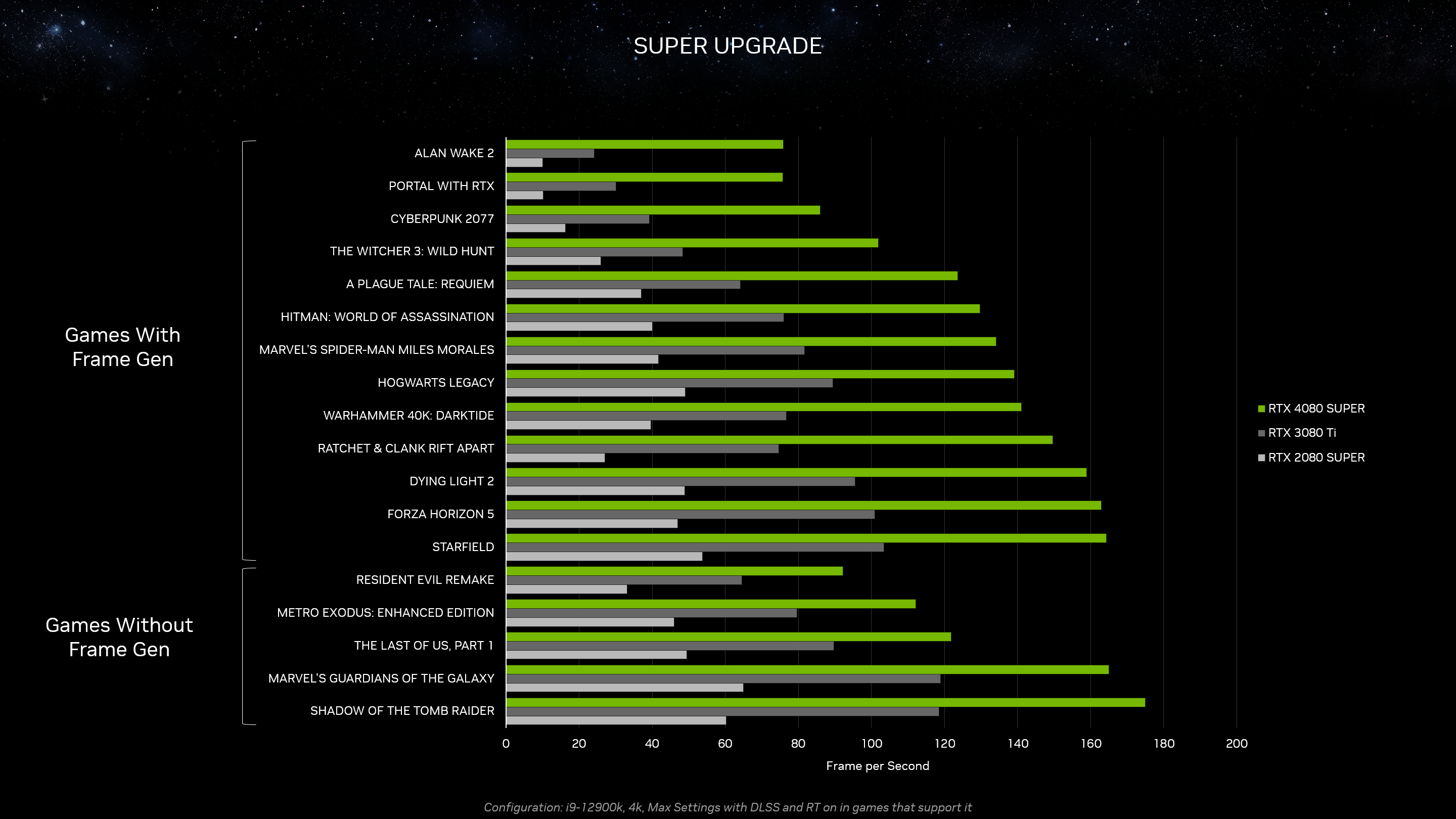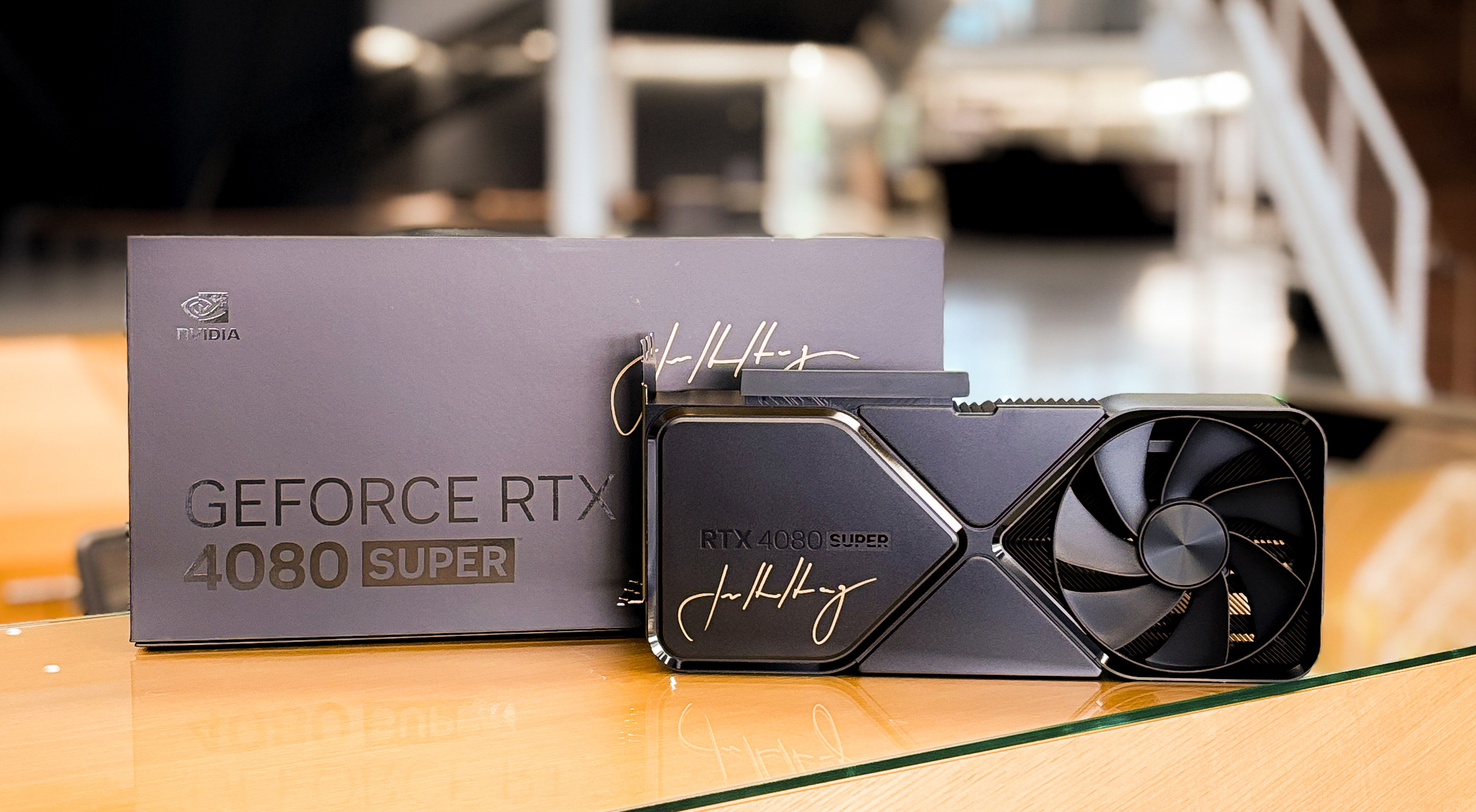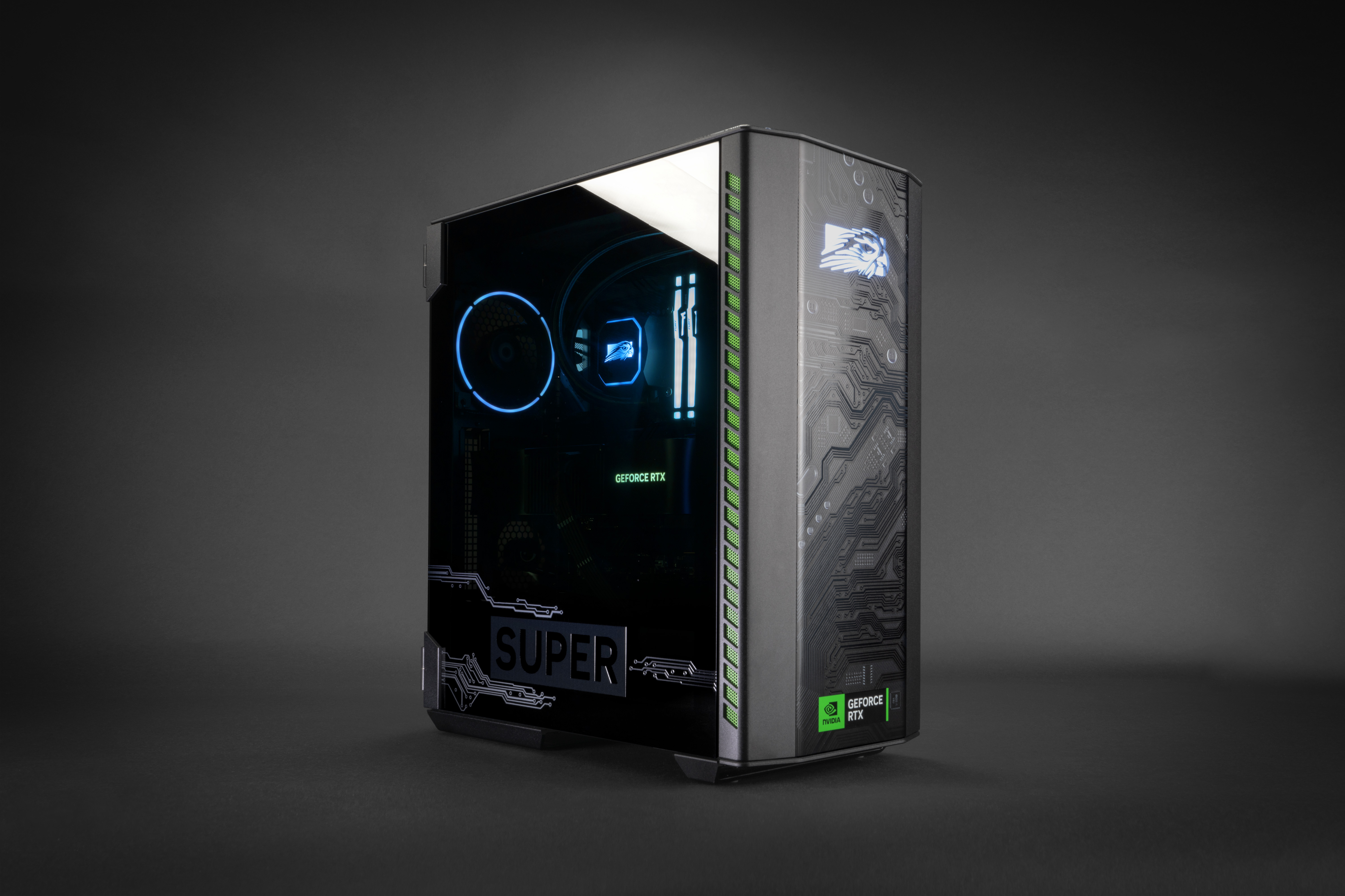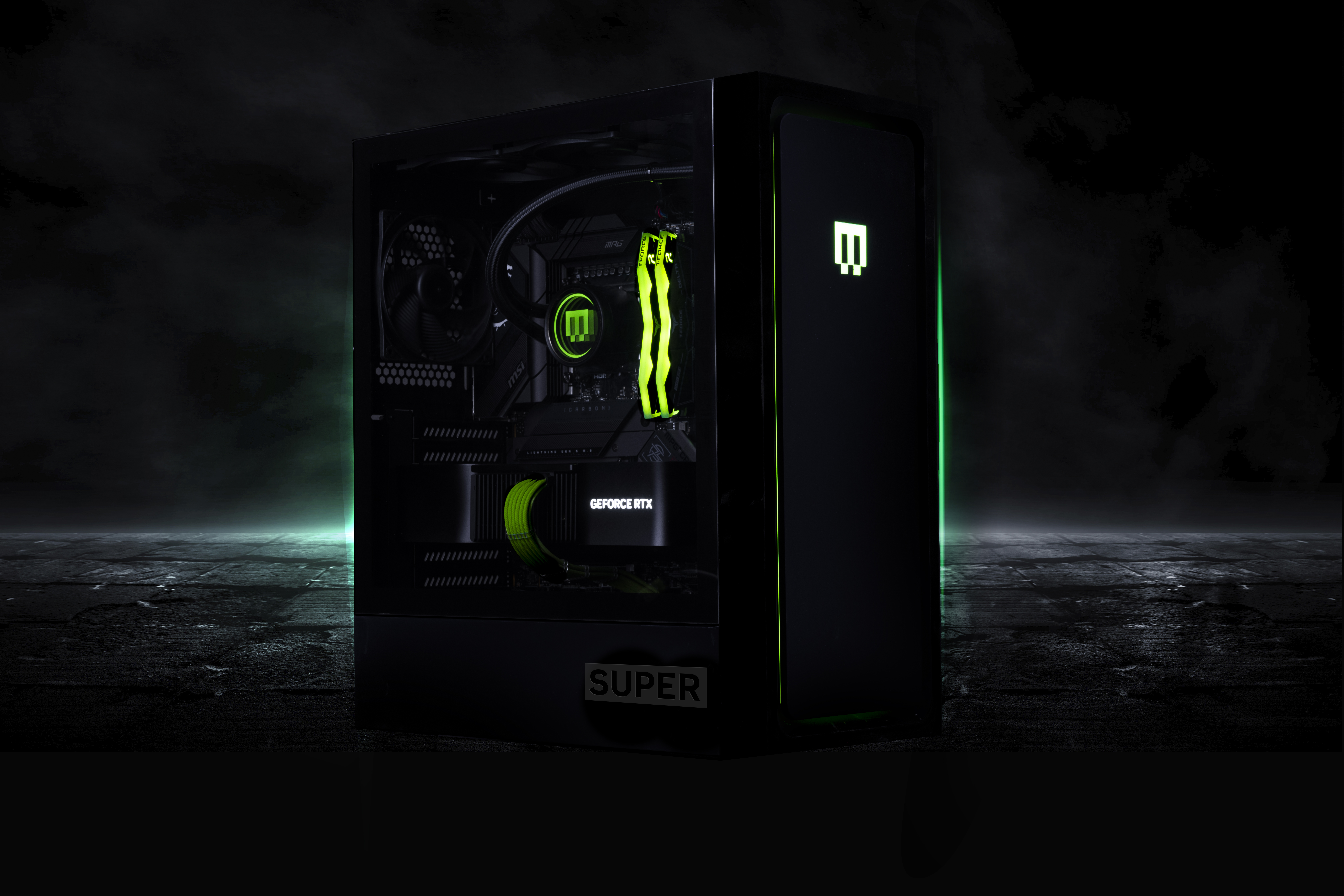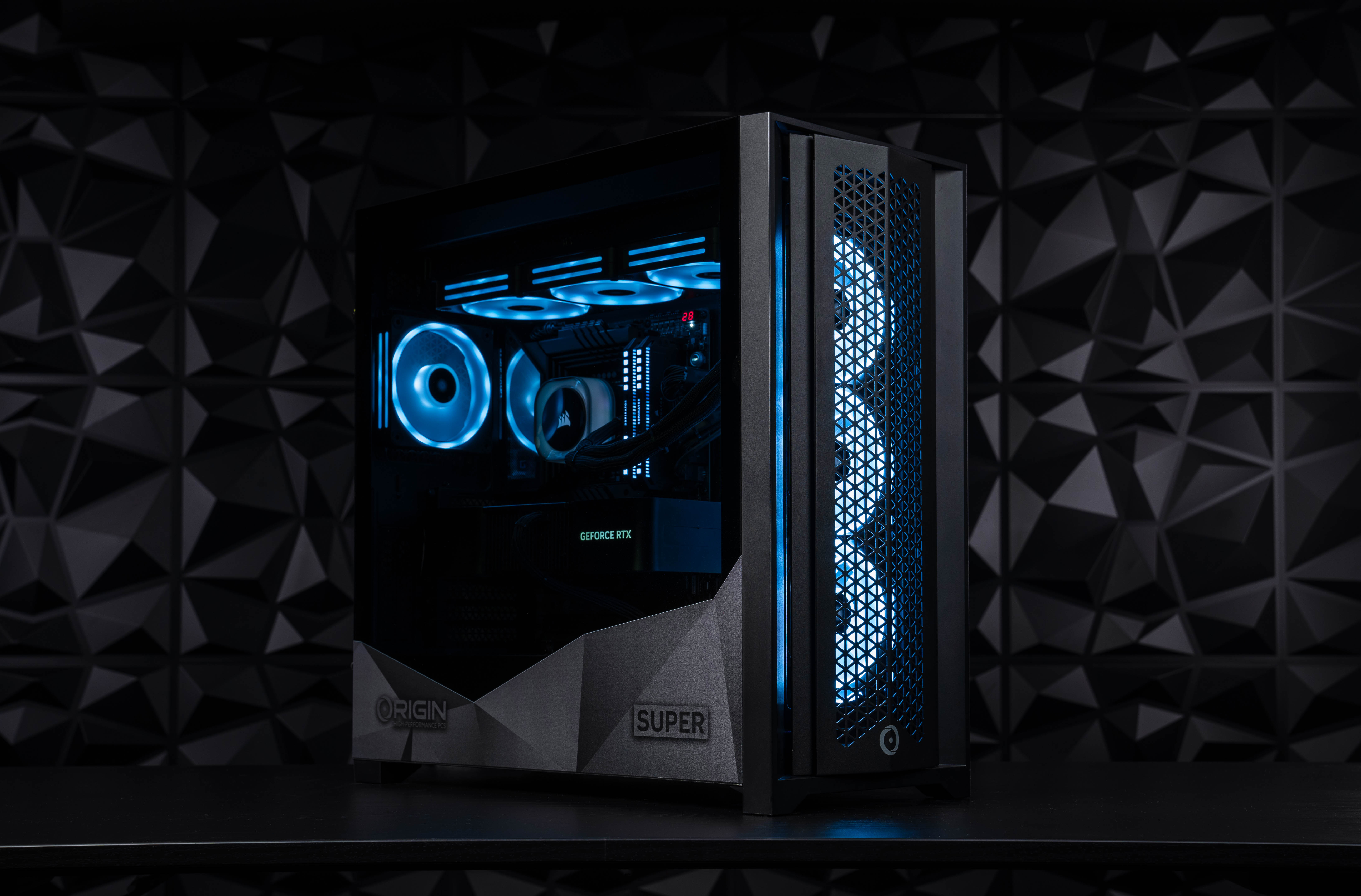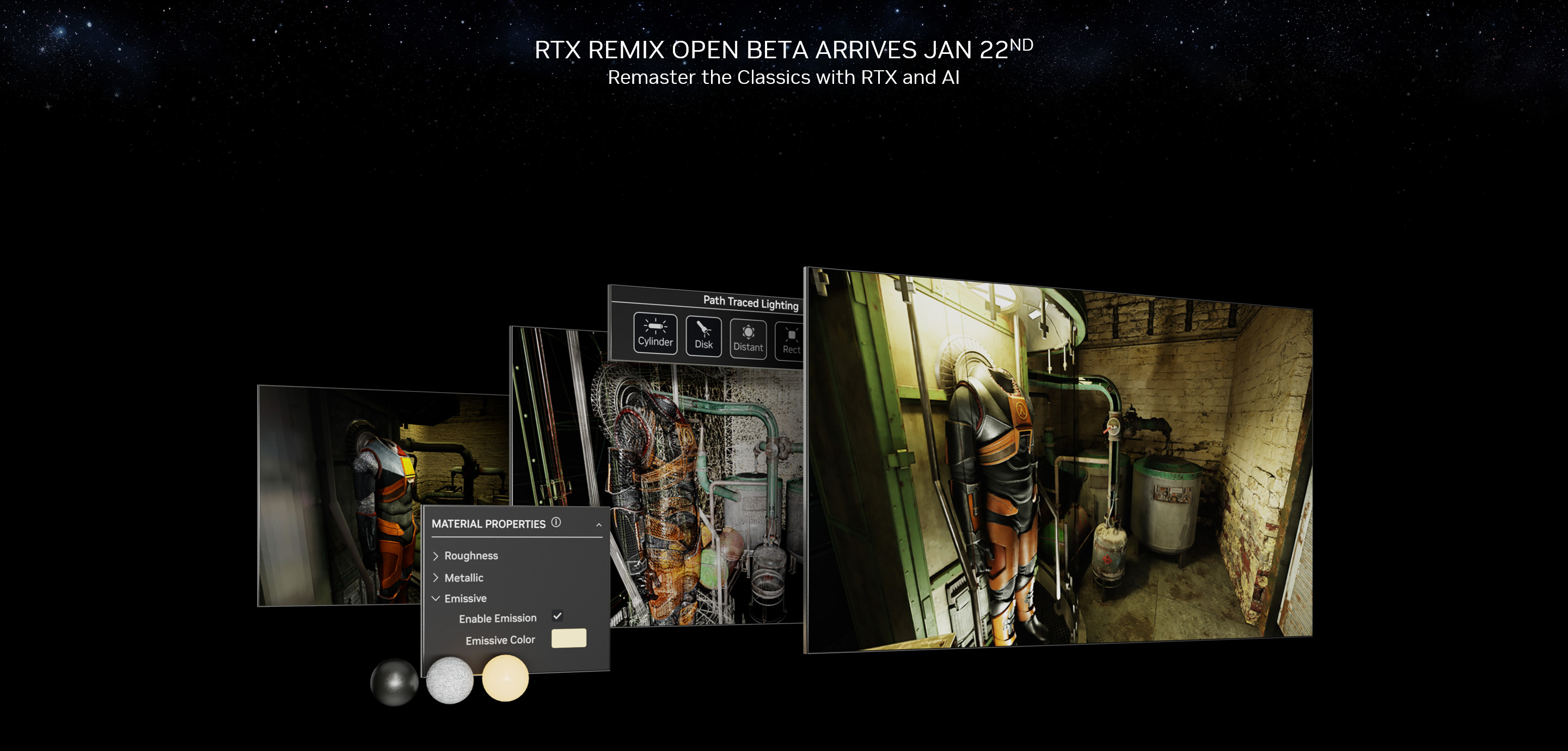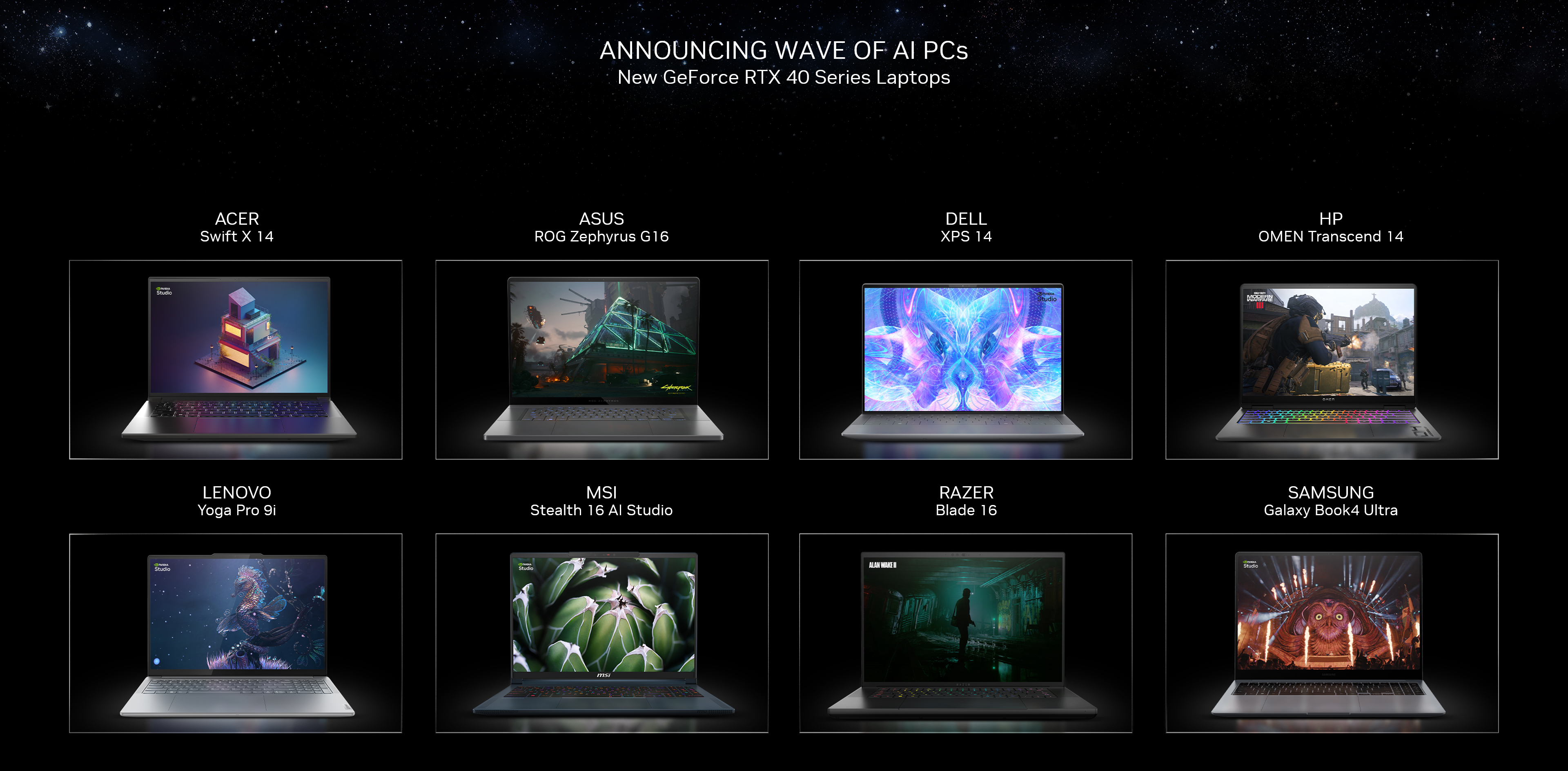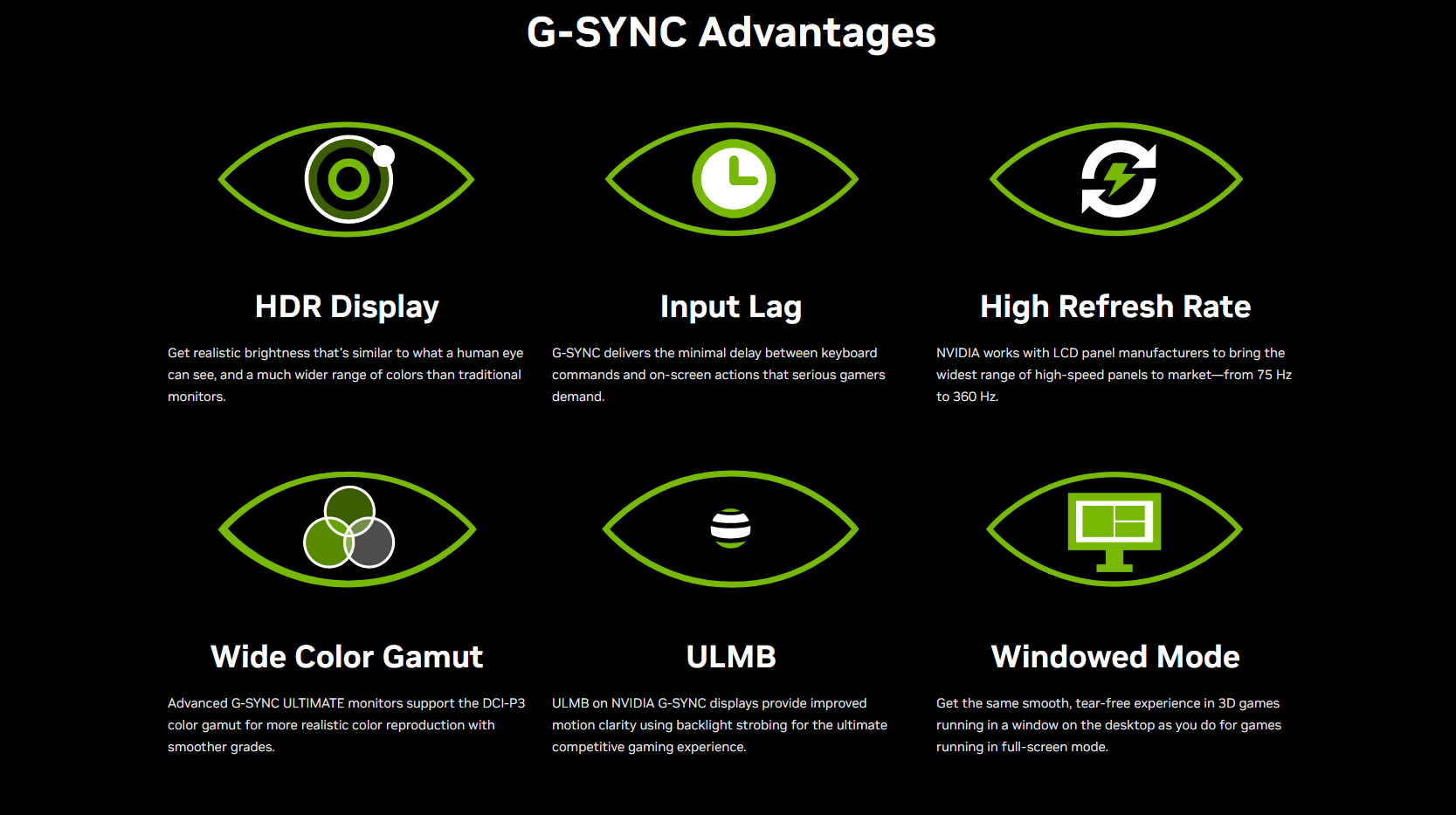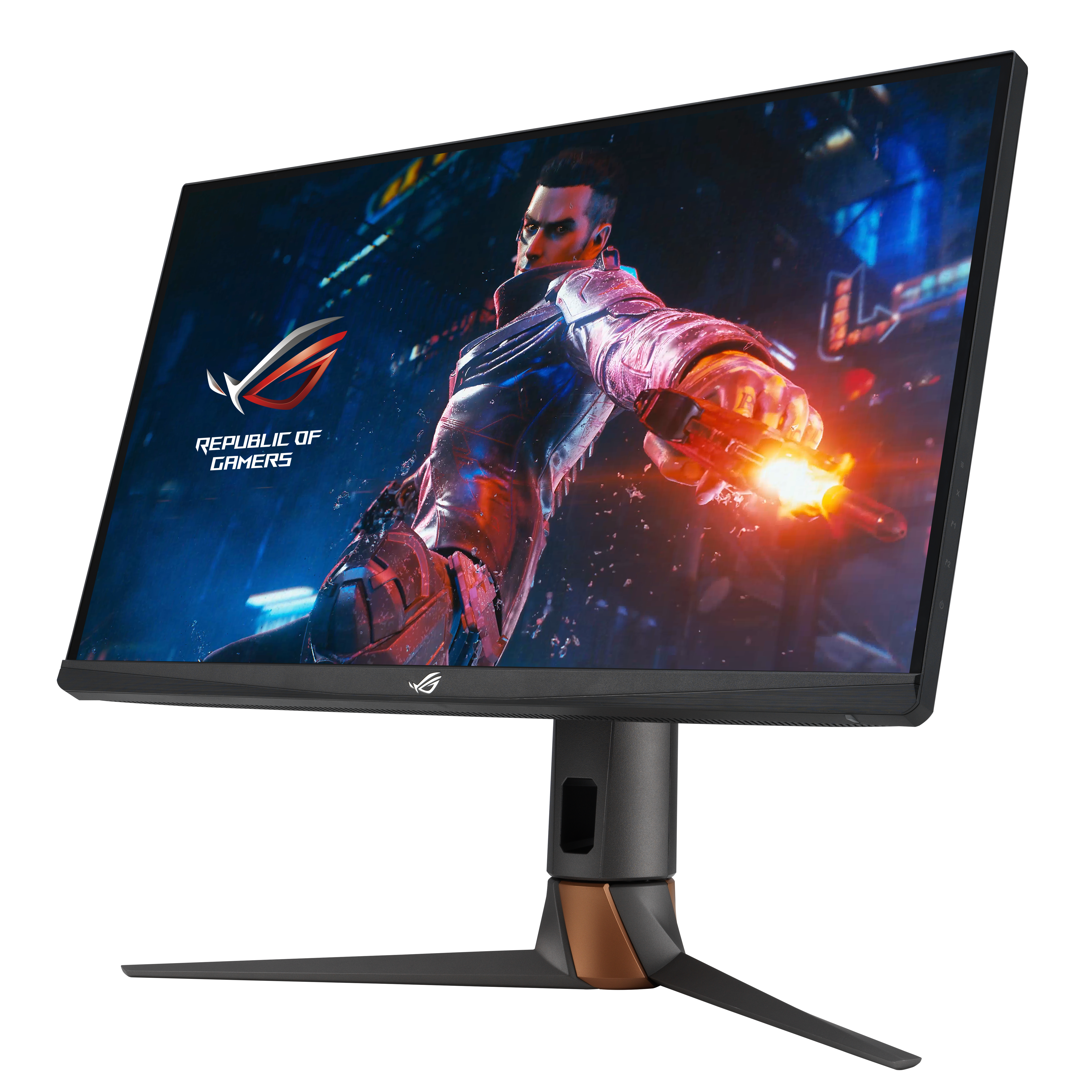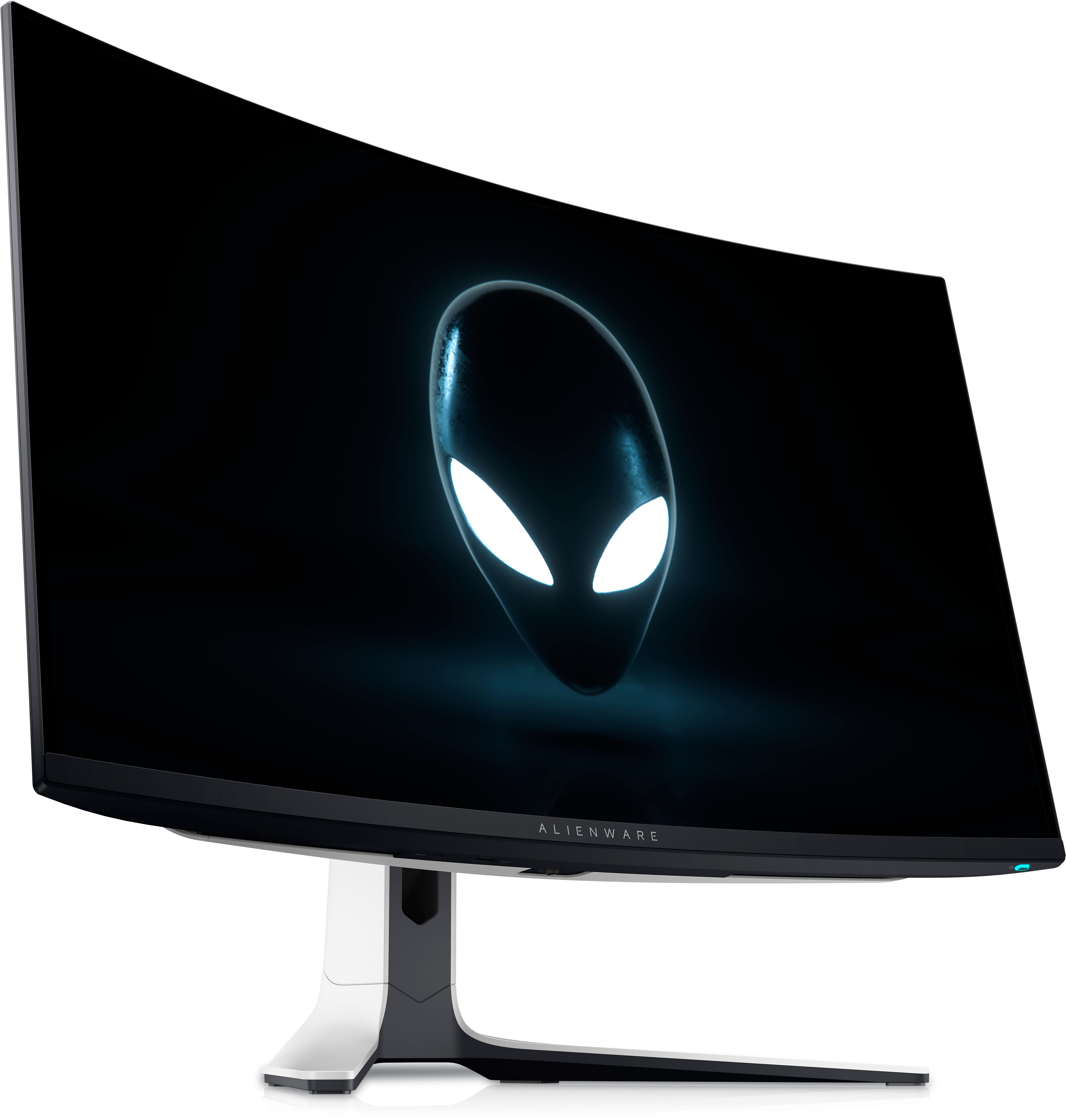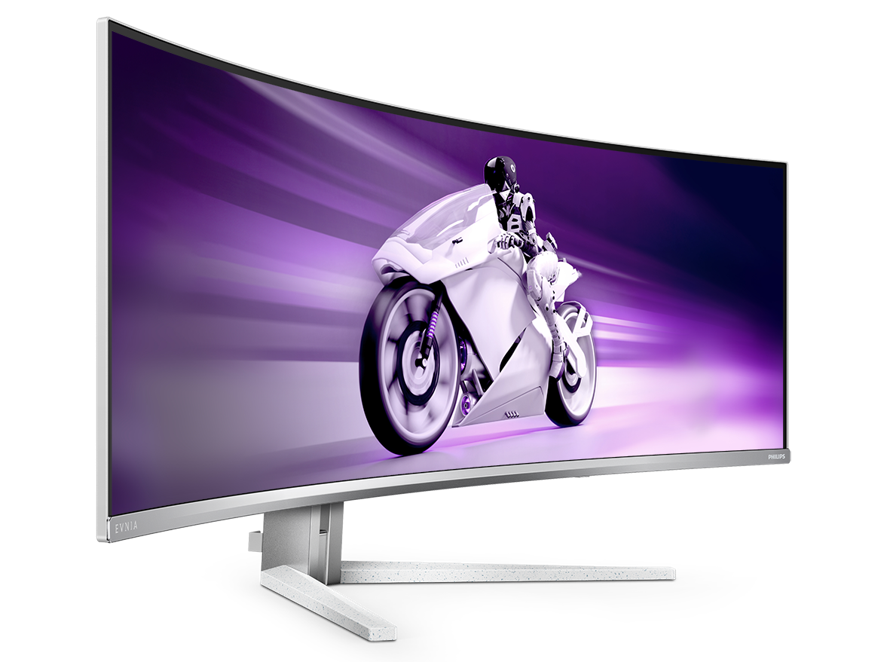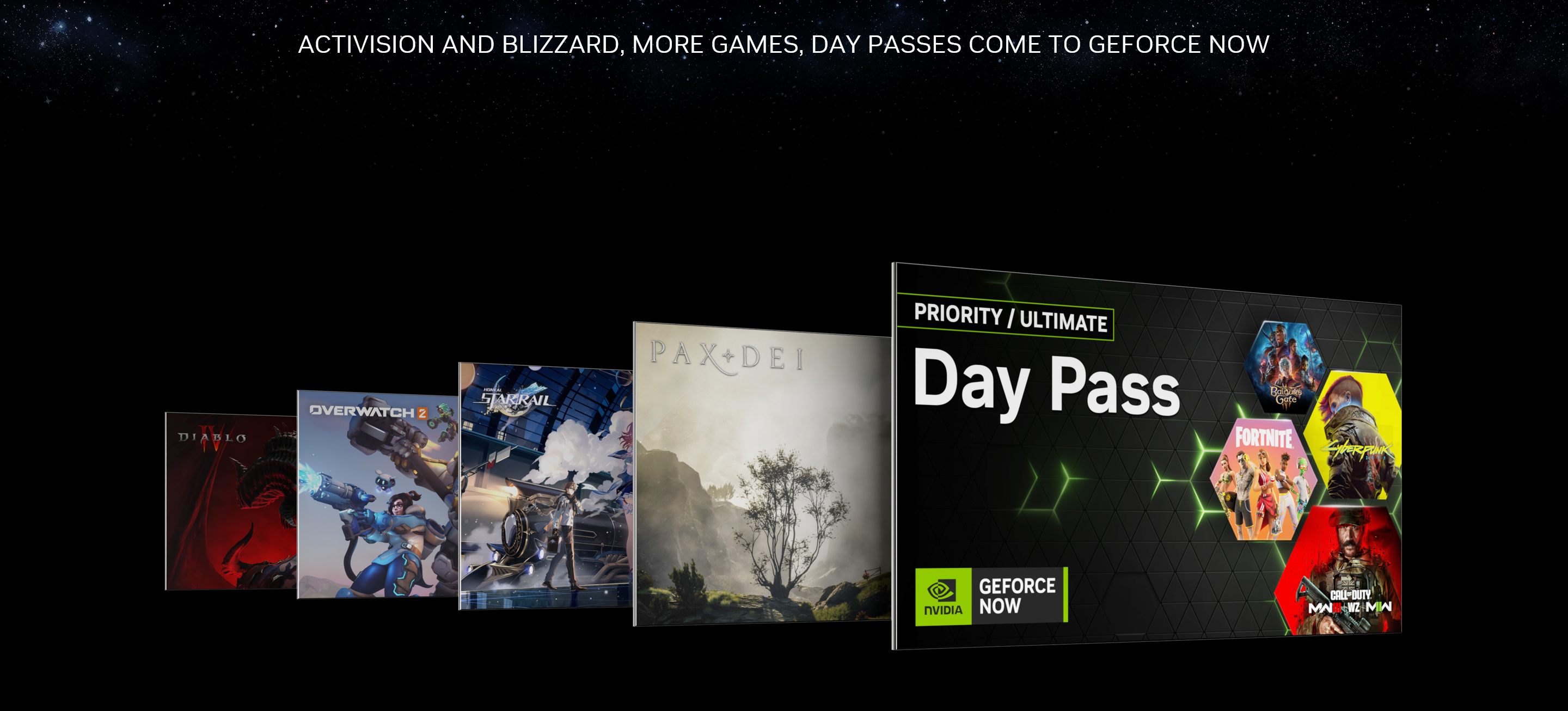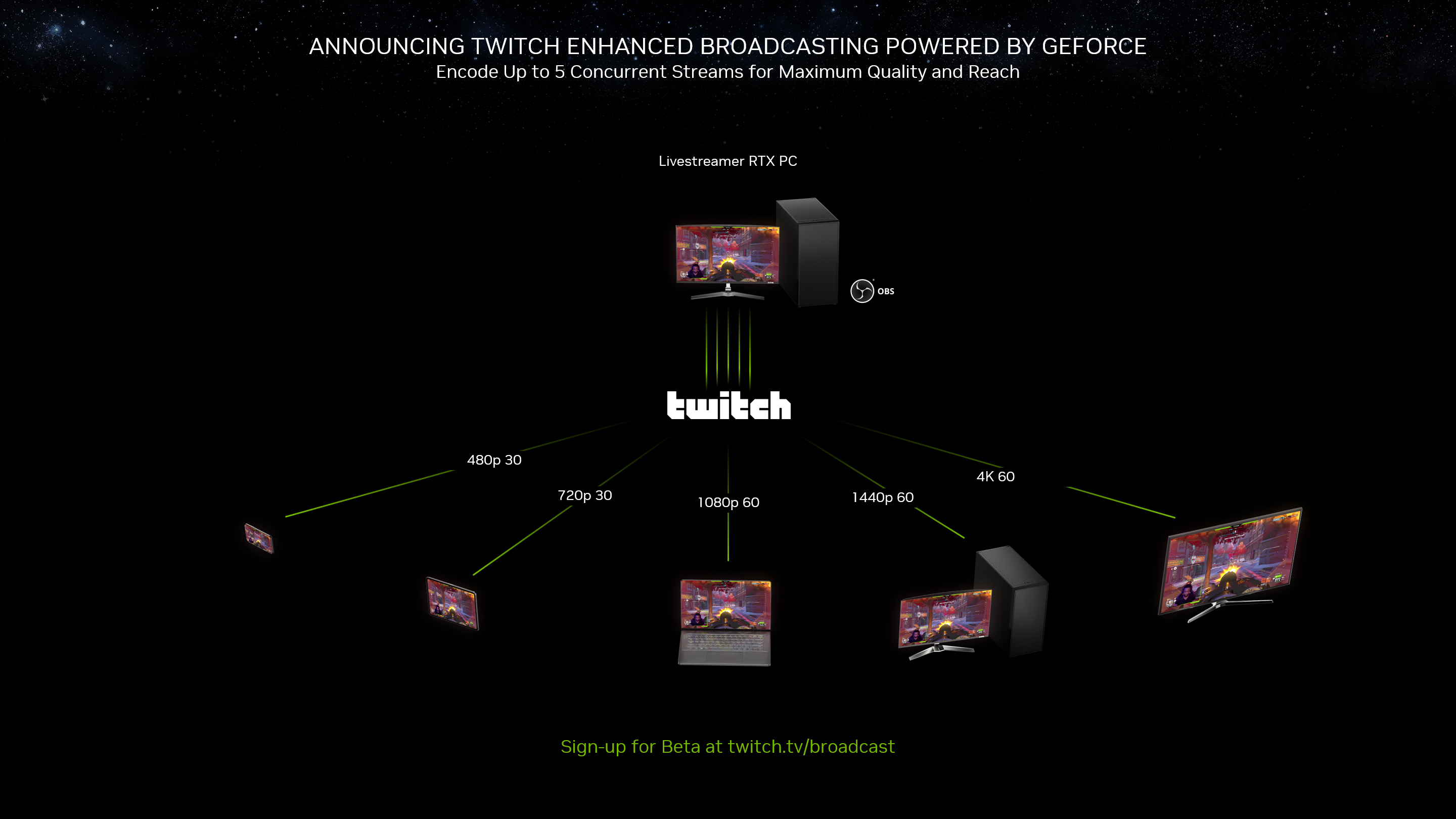GeForce At CES 2024: SUPER GPUs, 14 New RTX Games, Accelerating Gen AI, G-SYNC Innovations, RTX Remix Open Beta, Twitch Enhanced Broadcasting & More
To kick-off 2024 in style, NVIDIA headed to CES 2024 to unveil new GeForce RTX 40 SUPER Series graphics cards, new RTX games, new G-SYNC technologies, new Generative AI innovations, new enhancements for RTX Video Super Resolution, new GeForce NOW games and features, and tons more. Check out a summary of our GeForce announcements below, with links to in-depth articles. For all of NVIDIA’s other CES 2024 news, head to the NVIDIA Blog.
GeForce RTX 40 SUPER Series Graphics Cards Arrive This Month
The acclaimed GeForce RTX 40 Series just got SUPER: introducing our new GeForce RTX 4080 SUPER, GeForce RTX 4070 Ti SUPER, and GeForce RTX 4070 SUPER graphics cards, launching this January.
All three GeForce RTX 40 SUPER Series GPUs are faster than their predecessors and come with RTX platform superpowers that enhance games, apps, and AI tasks.
The GeForce RTX 4070 SUPER launches January 17th. It has 20% more cores than the RTX 4070, making it a super upgrade for 1440p gaming and creating.
In the most demanding games, it’s faster than a GeForce RTX 3090, while using a fraction of the power, and with DLSS 3 it’s 1.5X faster. Pricing starts at $599.
The GeForce RTX 4070 Ti SUPER is equipped with more cores, making it 1.6X faster than the RTX 3070 Ti in the most demanding games, and 2.5X faster with DLSS 3.
Featuring a 16GB frame buffer, accompanied by a 256-bit bus, it’s the perfect GPU to max out your high refresh 1440p panels. Creators will also love it for video editing and rendering large 3D scenes. It arrives January 24th, starting at $799.
The GeForce RTX 4080 SUPER has been upgraded with more cores and the world’s fastest video memory running at 23 Gbps. It’s 1.4X faster than the RTX 3080 Ti, and twice the speed of a GeForce RTX 3080 Ti with performance-multiplying frame generation.
In Alan Wake 2, Cyberpunk 2077, and Portal with RTX, players can immerse themselves in their fully ray traced visuals and every other setting cranked to the absolute max, making it perfect for 4K fully ray-traced gaming, 3D rendering, and the most demanding applications of Generative AI.
For further details about the three new GeForce RTX 40 SUPER Series graphics cards, head to their product pages and check out our announcement article.
Win A GeForce RTX 4080 SUPER Signed By NVIDIA CEO Jensen Huang
We have two Founders Edition GeForce RTX 4080 SUPER graphics cards signed by NVIDIA's founder and CEO, Jensen Huang, that we’re giving away - one for our social channels, and one for CES attendees. The first chance to win is by following our GeForce social channels on X, Facebook, Instagram, TikTok, and by looking for key prompts and instructions (please check the complete set of rules for the giveaway here).
If you’re attending CES 2024, you’ll have a second chance to win a signed GeForce RTX 4080 SUPER, plus $500 in Steam gift cards by visiting participating partner booths on the show floor and scanning the nearby QR code that directs to the entry form. Public QR codes are located at GIGABYTE (North Hall #9637) and Razer’s (Central Hall #15054) stands. Visitors to ACER, ASUS, HP, and MSI’s invite-only meeting rooms can also partake in the giveaway. Full details can be found in the terms and conditions.
Special GeForce RTX 40 SUPER Series Pre-Built PCs From Top System Builders Coming Soon. Plus, Here’s Your Chance To Win One!
To mark the release of the GeForce RTX 40 SUPER Series, NVIDIA has teamed up with some of the top system builders to create custom SUPER PC builds. At the heart of each incredible rig is the new GeForce RTX 4080 SUPER Founders Edition graphics card, powered by the supercharged NVIDIA Ada Lovelace architecture, and matched with top-shelf components that represent the pinnacle of cutting-edge performance and premium style.
For further details, and the chance to win each design from Digital Storm, Falcon Northwest, MAINGEAR, and Origin PC, head here.
14 Games Add RTX Technologies
Over 530 games and applications feature support for RTX technologies. At CES we’ve announced another 14 games are receiving RTX upgrades.
Dragon’s Dogma 2, Gray Zone Warfare, Half-Life 2 RTX, Horizon Forbidden West, Layers of Fear, Like a Dragon Gaiden: The Man Who Erased His Name, Like a Dragon: Infinite Wealth, NAKWON: LAST PARADISE, Pax Dei, Starminer, and THRONE AND LIBERTY will all launch with or upgrade to DLSS 3 this year, giving GeForce RTX 40 Series gamers unprecedented performance, and the highest levels of image quality.
Dragon’s Dogma 2, Gray Zone Warfare, Half-Life 2 RTX, and Starminer will also launch with ray traced effects, which run best on GeForce RTX GPUs thanks to their dedicated hardware RT Cores, and Diablo IV’s ray tracing upgrade is coming this March.
And later this month, Enshrouded and TEKKEN 8 launch with day-one support for DLSS 2.
Get all the details about each game and its RTX technology in our CES 2024 RTX Games article.
New Half-Life 2 RTX Trailer Released
Half-Life 2 RTX: An RTX Remix Project is a community remaster of Valve’s beloved game developed by four of Half-Life 2’s top mod teams, now working together under the banner of Orbifold Studios. Using NVIDIA RTX Remix, the modders are rebuilding materials with Physically Based Rendering (PBR) properties, adding extra geometric detail via Valve’s Hammer editor, and leveraging NVIDIA technologies including full ray tracing, DLSS 3.5, Reflex, and RTX IO to deliver a fantastic experience for GeForce RTX gamers.
At CES 2024, Orbifold Studios unveiled a new Half-Life 2 RTX trailer demonstrating their enhancements to Half-Life 2’s Ravenholm levels:
For further details about the project, plus new 4K comparison screenshots, head to our new Half-Life 2 RTX article.
NVIDIA RTX Remix Open Beta Begins January 22nd
If you were impressed by Half-Life 2 RTX, you can make your own NVIDIA RTX Remix remaster for a classic game starting January 22nd, when we release the NVIDIA RTX Remix Open Beta to the modding community.
Enhance classic games with NVIDIA RTX technologies to accelerate performance, improve image quality, and reduce file sizes. Mod with ease in the responsive RTX Remix app, share assets in OpenUSD format via NVIDIA Omniverse connected applications, and use your GeForce RTX GPU’s Tensor Cores to create remastered assets via Remix’s incredible Generative AI Texture Tool.
Learn more about Remix’s capabilities in our Open Beta article, and head here to sign up for an Open Beta notification, letting you know when it is released on January 22nd.
New RTX AI Laptops
Top OEMs are releasing a new wave of RTX AI laptops with GeForce RTX 40 Series Laptop GPUs that bring full generative AI capabilities to consumers. RTX is the fastest growing laptop platform, having grown 5 times in just the last 4 years. Over 50 million devices are enjoyed by gamers and creators across the globe. New systems start shipping later this month — from Acer, ASUS, Dell, HP, Lenovo, MSI, Razer, Samsung and more — enabling users to experience generative AI out-of-the-box and delivering raw performance ranging from a 20X to 60X increase when compared to NPUs. From 14” designs that are as slim as 16 millimeters, to the most powerful 18” devices, there is a laptop for every gamer and creator.
GeForce RTX 40 Series GPUs unlock the full potential of generative AI on PC — capable of running the broadest range of applications, with the highest performance. At the heart of RTX GPUs are Tensor Cores that dramatically speed up AI performance across the most demanding applications for work and play.
RTX-Accelerated Generative AI Powers New PC Experiences
The rich generative AI software stack built on top of RTX GPUs is also getting upgrades that improve gaming, creating and productivity.
RTX is bringing peak performance to the latest Stable Diffusion releases:
- TensorRT acceleration is now available in Stable Video Diffusion, SDXL Turbo and LCM.
- An updated version of the Stable Diffusion Automatic 1111 WebUI TensorRT extension includes acceleration for Stable Diffusion XL, SDXL Turbo, LCM-LoRA, and improved LoRA support.
TensorRT-LLM’s latest update adds Phi-2 to the growing list of pre-optimized models. And TensorRT-LLM performance can be experienced with Chat with RTX, an easy-to-use tech demo that allows AI enthusiasts to connect a PC LLM to their own data using a popular technique known as retrieval augmented generation (RAG). It enables users to interact with their notes, documents and other content.
NVIDIA ACE Evolves With New Microservices & New Kairos Demo
NVIDIA ACE is a suite of technologies that help developers bring digital avatars to life using generative AI. With ACE, generic non-playable characters (NPCs) can be turned into interactive characters capable of striking up a conversation, or can give you knowledge that leads to new quests.
At CES 2024 we announced the availability of ACE production microservices for NVIDIA Audio2Face (A2F) and NVIDIA Riva Automatic Speech Recognition (ASR), and that top digital avatar developers are embracing NVIDIA ACE technologies.
We also showcased the latest version of the Kairos demo in collaboration with Convai, to showcase how next-generation AI NPCs will revolutionize gaming.
Watch the new demo below, and learn more about NVIDIA ACE in our new article.
Introducing G-SYNC Pulsar Technology
NVIDIA’s journey in display technology has been marked by relentless innovation. The launch of G-SYNC in 2013 eradicated stutter by harmonizing the monitor’s refresh rate with the GPU’s output. This was just the beginning.
At CES 2024, we unveiled G-SYNC Pulsar, the next evolution of Variable Refresh Rate (VRR) technology, not only delivering a stutter-free experience and buttery smooth motion, but also a new gold standard for visual clarity and fidelity through the invention of variable frequency strobing, boosting effective motion clarity to over 1000Hz on the debut ASUS Pulsar monitor.
No longer will users have to choose between the smooth variable refresh or the improved motion clarity of Ultra Low Motion Blur (ULMB) – our new G-SYNC Pulsar technology delivers all the benefits of both, working in perfect harmony to deliver the definitive gaming monitor experience.
In the video below, a 1000 FPS high-speed pursuit camera recorded Counter-Strike 2 running identically on a 360Hz G-SYNC with Pulsar technology enabled, versus with Pulsar technology disabled. Played back at 1/24 speed, the reduction of monitor-based motion blur on the G-SYNC Pulsar display is immediately evident, greatly improving clarity, fidelity, target tracking and target acquisition, helping improve hit rate, and more, making users more competitive online.
With G-SYNC Pulsar, the clarity and visibility of content in motion is significantly improved, enabling you to track and shoot targets with increased precision
G-SYNC Pulsar stands as a testament to NVIDIA's unwavering commitment to innovation and redefining the boundaries of gaming technology, offering gamers a visual experience that is smoother, clearer, and more immersive than ever before. The technology will debut in the 360Hz 1440p ASUS ROG Swift PG27 Series gaming monitor later this year.
Learn much more in our G-SYNC Pulsar announcement article, and stay tuned to GeForce.com for further updates regarding the availability of G-SYNC Pulsar gaming monitors.
24 New G-SYNC Gaming Monitors, Displays & TVs Coming Soon
There are thousands of monitors, displays and TVs out there, but only the best receive the G-SYNC badge of honor. Monitors with dedicated G-SYNC modules push the limits of technology, reaching the highest possible refresh rates, and enabling advanced features such as G-SYNC esports mode. And G-SYNC ULTIMATE displays deliver stunning HDR experiences.
Hundreds of other displays are validated by NVIDIA as G-SYNC Compatible, giving confidence for buyers looking for displays that don’t blank, pulse, flicker, ghost, or otherwise artifact during Variable Refresh Rate (VRR) gaming. G-SYNC Compatible also ensures that a display operates in VRR at any game frame rate by supporting a VRR range of at least 2.4:1 (e.g. 60Hz-144Hz), and offers the gamer a seamless experience by enabling VRR by default on GeForce GPUs.
Manufacturers are increasingly adopting VRR, and many incorporate game modes and additional features that enhance the PC experience, whether gaming on a monitor or TV. To ensure a flawless out of the box experience, partners such as Alienware, AOC, ASUS, Dough, IO Data, LG, Philips, Thermaltake, and ViewSonic share their displays with us for testing and optimization.
At CES 2024, our partners unveiled 24 new G-SYNC gaming monitors, displays and TVs, from a 16 inch portable monitor, all the way up to 97 inch TVs.
For the full lowdown, head here.
GeForce NOW At CES: G-SYNC Technology, New Games, Day Passes & More
GeForce NOW is the best way to play your games over the cloud. Even if you don’t have a GeForce RTX PC or laptop, or you’re away from your system, you can still enjoy the latest games streaming from the cloud. Members can play over 1,800 of the real and full PC versions of games they already own from Steam, Xbox, Epic Games Store, Ubisoft and GOG.com, and over 100 supported PC Game Pass titles. Even games with DLSS, Reflex, Ray Tracing, and other RTX technologies can be streamed with GeForce NOW’s premium memberships.
At CES 2024, the GeForce NOW team made a whole host of announcements:
- Triple-A games from top publishers are coming to the service soon, including Diablo IV and Overwatch 2 from Activision and Blizzard, Honkai: Star Rail from HoYoverse, Exoprimal from Capcom, and Pax Dei from Mainframe Industries.
- GeForce NOW Day Passes will be available in early February, enabling fast access to try out all the benefits of a premium gaming experience for 24 hours before committing to one or six-month memberships.
- G-SYNC technology in the cloud will vary display and refresh rates of streams on G-SYNC and G-SYNC Compatible monitors and displays, further reducing system latency to increase smoothness.
- Android devices are transforming into portable high-res gaming rigs, streaming GeForce NOW games at up to 1440p when connected to a monitor or TV. Connect via a portable docking station and you can play with a full complement of accessories wherever you are. This was on display in a tech demo at CES, streaming Cyberpunk 2077 and Alan Wake 2 from GeForce NOW servers in Los Angeles to a Samsung Galaxy S23 Ultra in Las Vegas, which was connected to a 1440p monitor.
- NVIDIA will begin operating GeForce NOW in Japan starting in Q2 2024, alongside GeForce NOW Alliance partner KDDI. GeForce NOW will bring the power of Ultimate, its highest-performance membership, to the region for the first time.
For further details about each, head on over to the GeForce NOW CES 2024 NVIDIA Blog.
Available Later This Month, RTX Video HDR Uses AI To Enhance SDR Content
RTX Video HDR adds a new AI-enhanced feature to all GeForce RTX GPUs, instantly converting any Standard Dynamic Range (SDR) video playing in internet browsers into vibrant High Dynamic Range (HDR).
HDR enables stunning video quality but is not widely used online because of the extra work required. Using the power of Tensor Cores on GeForce RTX GPUs, RTX Video HDR allows GeForce RTX GPU owners to maximize their HDR panel’s ability to display more vivid, dynamic colors, preserving intricate details that may be inadvertently rendered unidentifiable due to video compression.
RTX Video HDR and RTX Video Super Resolution can be used together to produce the clearest livestreamed video anywhere, anytime. The combined features work on Chromium-based browsers such as Google Chrome or Microsoft Edge, Mozilla Firefox, and the VLC media player (via the RTX branch).
RTX Video HDR will be released as part of new Game Ready and Studio Drivers later this month, and can be enabled via the NVIDIA Control Panel.
GeForce RTX Livestreaming: Twitch, OBS & NVIDIA To Enable Multi-Encode Broadcasting This Month
When setting up their broadcasts, most Twitch streamers must choose between a higher resolution output, or reliable streaming to more devices. High-quality video provides more enjoyable viewing experiences, but causes streams to buffer for viewers with low bandwidth. Streaming lower-quality video allows more people to watch the content seamlessly, but introduces artifacts and renders content at a lower resolution.
Twitch offers server-side transcoding for top-performing channels, meaning different versions of the same stream will be created for different bandwidth levels, improving the viewing experience. However, many channels are left with a single stream option.
Twitch, OBS and NVIDIA have collaborated on a new feature to address this problem: Twitch Enhanced Broadcasting, releasing in beta later this month. With this new feature, GeForce RTX GPU owners will be able to broadcast up to three streams simultaneously; an increase to five encodes is planned for a later release.
In future updates, Twitch will test higher-input bit rates as well as new codecs, which will enable streamers to broadcast at up to 4K at 60 frames per second for the first time. The new codecs include the latest-generation AV1 for GeForce RTX 40 Series GPUs, which provides 40% more encoding efficiency than H.264, and HEVC for previous-generation GeForce GPUs.
Getty Images Releases AI Image Generation Tools Powered By NVIDIA Picasso
Today, iStock by Getty Images is releasing a GenAI service built on NVIDIA Picasso, an AI foundry for visual design. Generative AI by iStock enables users to create 4K imagery from text using an AI model trained on Getty Images’ extensive catalog of licensed, commercially safe creative content.
Alongside the release of the service on the iStock website, Getty Images is also making advanced inpainting and outpainting features available via application programming interfaces, launching on iStock.com and Gettyimages.com soon. These new editing APIs will give customers powerful control over their generated images. For additional details head to the Generative AI by iStock blog.
For More Announcements…
Stay tuned to GeForce.com throughout 2024 to learn about new DLSS, RTX and Reflex game enhancements, new drivers, new features, and new product launches. As everything above launches, we’ll be bringing you further details, and info about how to use new technologies to enhance your games, apps and streaming.
